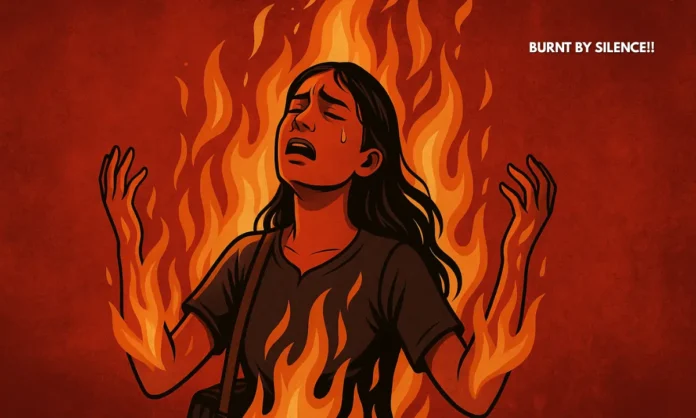SUMMARY
- 20-year-old B.Ed student dies after self-immolation over professor’s alleged harassment
- Principal delayed action, ICC complaint warned of suicide 11 days earlier
- Peer bullying, administrative apathy, and political misuse deepened her isolation
“Ignored, Isolated, and Humiliated”: A Campus Tragedy in Balasore
When a 20-year-old B.Ed student of Fakir Mohan Autonomous College in Balasore, Odisha, set herself ablaze after repeated pleas for justice were ignored, she left behind more than just a charred body—she ignited national outrage over how institutional indifference, character assassination, and student politics can destroy lives.
The young woman, who had filed a sexual harassment complaint against her HoD, Samir Kumar Sahu, was not only denied support by the college administration but also reportedly targeted by her own peers. Eleven days before she took the extreme step, she warned in her complaint to the Internal Complaint Committee (ICC) that she might die by suicide if action wasn’t taken. The ICC did not escalate the matter. The principal, too, stalled action—taking 7 to 8 days but delivering no resolution.
But the agony didn’t end there. What followed was a relentless campaign of character defamation on campus and social media, with juniors calling her a “bad girl.” That public shaming, paired with administrative silence, pushed the young woman into what her friend described as an “Agni Pariksha.” The fire that consumed her body now burns as a symbol of everything wrong in Indian academia’s handling of gender-based violence.
A 20-year-old student from Odisha d!ed after setting herself on fire over ‘inaction’ on her sexual harassment complaint. She was admitted to AIIMS Bhubaneshwar, and died after battling for life for three days. #Odisha #Balasore #College #womenssafety pic.twitter.com/LI0er40Juk
— Peek TV (@PeekTV_in) July 15, 2025
A System That Refused to Listen
- Student approached principal multiple times with harassment complaint
- ICC acknowledged the student’s clear suicide warning in her formal statement
- Despite the gravity of allegations, professor continued to enjoy peer support
In a haunting account shared with CNN-News18, the student’s close friend revealed how she had repeatedly approached the college principal but received nothing more than vague assurances. “The principal warned her of consequences if she failed to prove her complaint,” the friend said. On June 30, a group of students accompanied the victim again to confront the administration—still, no action followed.
Her ICC complaint, dated July 1, revealed an ominous premonition. She mentioned suicidal thoughts and pleaded for urgent action. Yet the accused, Samir Kumar Sahu, allegedly continued his campaign of intimidation. ICC member Minati Sethi confirmed that Sahu made explicit comments, asking the student for a “favour” and saying, “You are not a child to not understand what favour I need.”
The girl reportedly felt trapped—denied justice, harassed by the accused, and humiliated by peers who sided with the professor. In what now appears as institutional complicity, the ICC failed to forward the matter to police despite its severity.
Character Assassination in the Digital Age
- Victim targeted online and offline, called a “bad girl” by juniors
- Peer group reportedly instigated by HoD to malign her image
- Student union allegedly used her case as a “political tool”
The cruelty did not end with silence; it turned active. According to the victim’s friend, juniors on campus were instigated to ridicule the girl, calling her derogatory names on social media. “She was being used as a political tool by NSUI (student wing of the Congress). The same people who show sympathy today were the ones who defamed her yesterday,” the friend added.
On the day she self-immolated, her friends said she appeared “calm” in the morning. But the inability to prove her claims—and the administration’s demand for “evidence”—pushed her toward a horrific decision. “She couldn’t provide proof. That crushed her spirit. She took it as her last test, her Agni Pariksha,” her friend said. The burn wounds covered 95% of her body.
Institutional Crackdown Begins—but Too Late
- Principal and HoD arrested for abetment to suicide
- UGC sets up four-member fact-finding committee
- AIIMS Bhubaneswar confirms victim’s critical burn injuries led to death
After immense media and public pressure, Odisha Police arrested both the principal and the HoD under abetment to suicide charges. The University Grants Commission (UGC) responded by launching a four-member fact-finding team.
But these developments are little comfort to the family who lost a bright young woman with a teaching dream. She had suffered alone, shamed by her peers, cornered by silence, and ultimately undone by a system that refused to act.
The friend who watched her burn put it best: “She did not burn alone—all of us are burning with her. She taught us to always fight for the rights of girls.”
“Proof or Silence?”: A Fire That Should Never Have Been Lit
The Balasore immolation case is not just about one victim or one college—it’s about a culture that still questions survivors more than it does the accused. It is about gatekeeping justice behind administrative red tape. And it’s about the crushing weight of peer cruelty in an era where defamation spreads in megabytes.
The fire may have consumed her, but it also exposes the deep rot that exists within academic institutions when complaints become liabilities instead of cries for help. This was not just a suicide—it was a failure of collective conscience.


